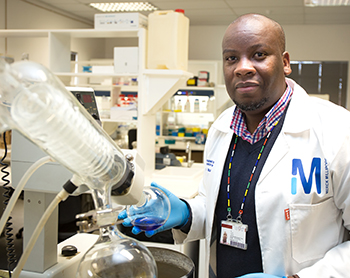
Dr Olihile Sebolai (Microbiology) is
one of two Fulbright scholars the
UFS Prestige Scholars’ Programme
has produced. He was a Fulbright
scholar at the University of Missouri
(Kansas City) and before that
conducted work at the University
of Birmingham in the UK.
Photo: Anja Aucamp
Twenty years. That is the difference between the average age of a UFS Prestige Scholar (35) and the average age of a South African academic (55). Since its inception in 2011, the UFS’s Prestige Scholars’ Programme (PSP) has pro-actively addressed the ageing profile of academia and the need to transform the social composition of the South African academy. In doing so it has generated more than R67 million in research funding, including R10 million in student and post-doctoral funding.
The programme seeks to identify, cultivate and promote outstanding scholarship among “young” members of the UFS academic staff – those who have acquired a doctorate within the last five years. It provides support (funding applications, report writing, etc.) and helps with international placements in order to accelerate the establishment of an international footprint in expectation of the participants’ entry into the professoriate.
The programme mentors scholars from five faculties at the UFS. PSP scholars have conducted research and established collaborations in North America, Europe and Japan at institutions such as Harvard, UCLA, Cornell University, University of Michigan, University of Missouri, University of British Columbia, Oxford University, Cambridge University, University of Manchester, University of Birmingham, Basel University, University of Bologna, Leiden University, Uppsala University, Okinawa Institute of Science & Technology and Obihiro University of Agriculture and Veterinary Medicine.